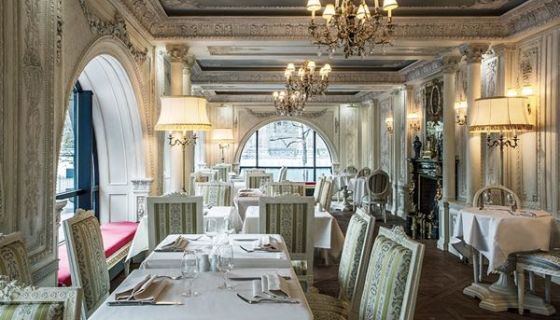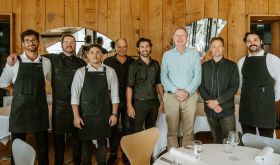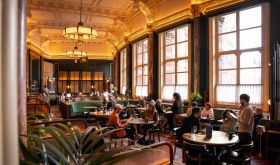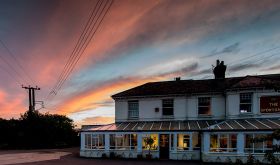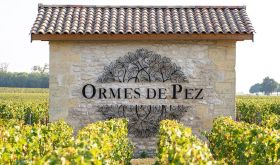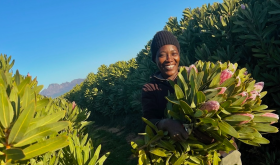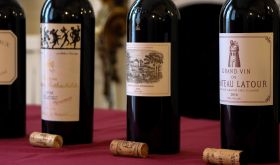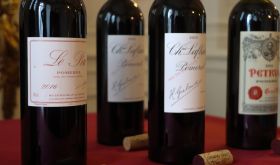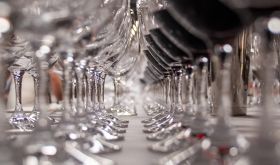I just wonder, is France on the turn?
I speak in the gastronomic sense, of course, and my rhetorical question is asked with a rather nebulous, and very wide, answer in mind. But what I mean more pointedly is whether France is ready to reassert itself, as it did in the 1970s and 1980s, and lead the rest of the world’s chefs into a more exciting, and spicier, future?
The threshold is already high. I acknowledge that our careers, plus our choice of a second home, lead us to spend more time in France than in any country other than England. But still I was slightly surprised by how many restaurants in France appeared in the list of my most memorable meals of last year. Three out of the nine I wrote about a month ago were in France: the Troisgros outside Roanne, Ellsworth in Paris and Bourdasso up in the hills of the Corbières in the Languedoc.
This feeling, that French cooking is on the up, is not that new. After all France starts with three great advantages. The first is historical as France is the country that created the modern restaurant at the beginning of the nineteenth century. The second is the depth of culinary knowledge and skills that this history has generated, while the third relates to the sheer quality of the produce that seems to abound in every market in every town.
But as was the case with French winemakers for so long, neither tradition nor even good grapes necessarily make good wine. And with wine it took the advent of a younger generation of French winemakers, often inspired by the influx of flying winemakers from overseas or by their own experiences overseas, to light the flame that has so obviously inspired so many to make so many better French wines – particularly at the lower end.
These feelings were given greater credence by a recent lunch in Paris with Guillaume Rochette, a Frenchman who made London his home 30 odd years ago when I first wrote about him in my Financial Times column. Then Rochette was opening up Eureka Executive Search, an agency specialising in chefs and senior management for the restaurant industry. Despite his years in the UK, Rochette never lost his accent nor his penchant for the very best French food and wine.
Eventually, he opened a branch of his office in Paris that never performed as well as his London office but Rochette had carved out a separate niche for himself. In this he was fortunate to have met restaurateur Alan Yau at an early stage, to have got to know Arjun Waney, the founder of Zuma, Roka and the Arts Club, and to have secured the support of restaurateur and financier Ken Sanker on to his Eureka board.
What united all these individuals and Rochette was London’s changing appetite for spice and the need, once they had proved successful here, to broker restaurant deals all over the world. In Moscow, Dubai, Abu Dhabi, Hong Kong, Singapore and Shanghai, all cities that Rochette got to know extremely well. Despite the odd setback, Rochette seemed very happy – the epitome of a successful French export.
Imagine my surprise when, last September, I received an email from Rochette informing me that after 34 years he had moved back to Paris with his wife and three daughters.
Over lunch at Le Camondo, a restaurant that illustrates the much more casual approach to dining now evident in Paris (some of the tables, for instance, feel more like coffee tables) close to his home on the rue Monceau, Rochette gave me some of the reasons for his move. Partly, this was negative. Like many in the hospitality industry he is worried about the consequence of Brexit both professionally and for his family. But mainly it was because he has sensed a significant change in the French approach to what they consider a successful restaurant, more fusion, more spice, more adventure. And with that, he explained, there comes the attraction of a more adventurous approach to financing restaurants that has definite advantages and disadvantages. The latter, such as a gradual diminution in the original founder’s vision and enthusiasm, being perhaps hidden but unwelcome for the customer.
After our lunch, it was time to see one of Rochette’s recently opened projects. A short taxi ride brought us to Café Pouchkine on the corner site of Place de la Madeleine, in the former offices of Orange. It had opened only a few days before, as we could smell from the lingering aromas of paint and resin from the application of wood onto the intricate faux Louis XV walls (see picture above).
The original Café Pushkin is of course in Moscow and is the creation of Andrey Dellos, the Russian restaurateur whom I met in Moscow in 2005. The original, highly evocative of the city in the nineteenth century, is not to be missed but Dellos has had less luck outside his native country. He had to close Café Pushkin in New York and the establishment on the site he acquired and spent a lot of time and money on in London, never materialised.
There was once a smaller Café Pouchkine in Paris but now Dellos has opened his flagship in partnership with chef Alain Ducasse, who is responsible for all the savoury dishes. As we didn’t arrive until after lunch we did not try any of these but everything sweet was delicious, with the exception of the rather stodgy mille feuille, and the tea too was very good. The style of service, the ambience and the sequence of small rooms (in one of which Mrs Roman Abramovich was apparently holding a small lunch party) make the management of the whole quite complex but all add to its charms. In appointing Stéphane Jitiaux, formerly CEO of Ladurée the macaroon specialists, Dellos has made a very smart move.
I am not alone in seeing brighter prospects for all things French. In an editorial in the latest Economist, the magazine’s editors pick France as their 'country of the year’ while acknowledging that its choices since it initiated this prize have not always been faultless (notably the magazine’s choice of Myanmar in 2015). But Macron’s achievements in winning the presidency and then overseeing his party’s winning the majority of the seats in the National Assembly cannot be doubted.
How can this change affect French food? French wine producers must be grateful that after years of neglect from the sequence of Frenchmen as president who ignored or disdained wine, they now have a president who acknowledges that a meal without wine is a ‘sad meal’. Perhaps if he were to acknowledge that a meal without spices, or some form of heat, was not really a meal at all, that would be the catalyst that could change French cuisine irrevocably for the better?
Le Camondo 61 bis rue de Monceau, 75008 Paris; tel +33 1 45 83 40 40
Café Pouchkine 16 place de la Madeleine, 75008 Paris; tel +33 1 53 43 81 60

